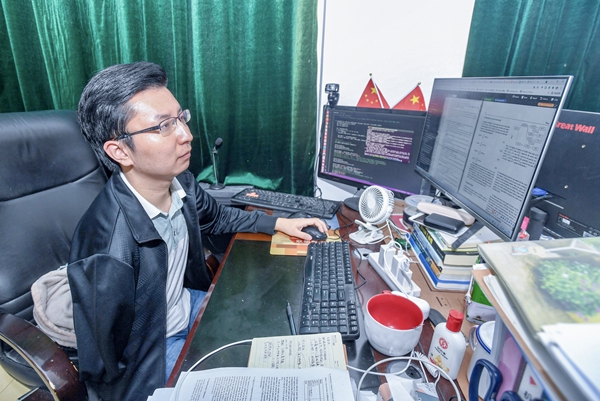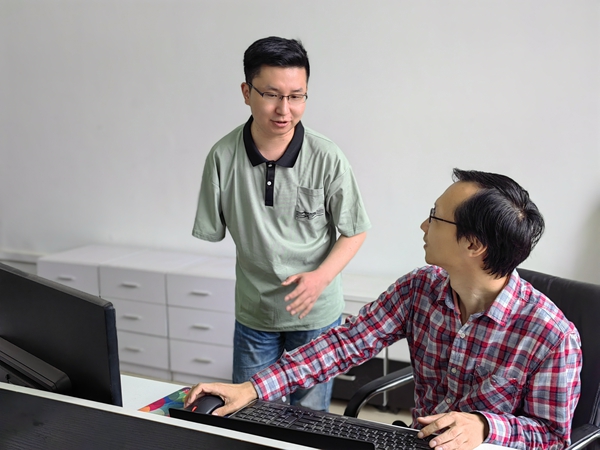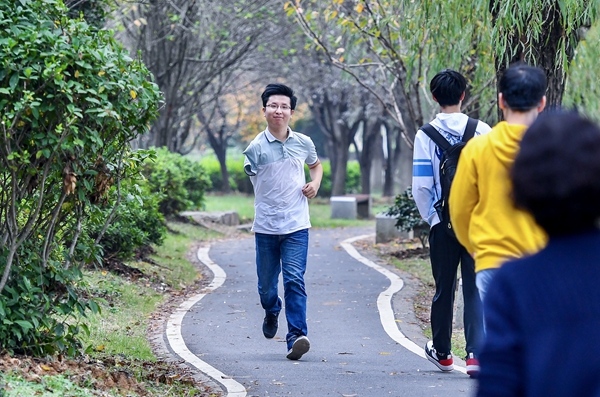
Yuan Xin works on a research paper in a lab at Wuhan University of Science and Technology.[Photo provided to China Daily]
Researcher Yuan Xin learned from a young age that to make a difference, he would need his brain to do the heavy lifting, Yang Feiyue reports.
A childhood accident cost Yuan Xin his right arm.
Yet, the 27-year-old from a small village in Xianning city, Central China's Hubei province, has taken it in his stride and never looked back.
It was fate's joke on me, Yuan says.
If anything, the loss was converted into an inexhaustible source of motivation, helping him roll with life's punches and shoot for the stars.
With his remaining hand, Yuan has come up with ingenious designs and patents that have earned him more than 60 prizes and awards that are envy of his peers.
One of the most unforgettable experiences is winning second prize at the Challenge Cup in 2019, says Yuan, who is now pursuing his doctoral degree in computer science at the Wuhan University of Science and Technology.
The Challenge Cup contest was initiated in 1989 and is reputed among Chinese college students as being the Olympics of science and technology.
Yuan's entry focused on the development of a shipborne water cannon that integrates computer-enhanced vision, artificial intelligence and object detection, all of which falls under his field of expertise.
I settled on it as the project for the competition after I found existing water cannons at the time mostly relied on manual force, he says.
Water cannons are mostly used for targeting and expelling illegitimate fishing boats.
If we could deliver automatic monitoring and response, a great deal of labor would be saved, Yuan says, adding that it would also enable sharper observation and more efficient control of nautical crime, especially at night.
His idea was adopted by his classmates, and they formed a team of eight for the competition. Yuan was elected the team leader.
They got down to work on the programing and design and took it to a water cannon plant in Jiangsu province and a shipyard in Guangdong province to test and debug their automatic operating system.
We had to make sure our auto system fit with a real-life cannon and ship, and took into account the wind fluctuation and other factors that would affect the operation of the water cannon, Yuan explains.
So the field experiment was indispensable.
The preparation lasted for more than a year, and, after much trial and error, Yuan's project eventually succeeded. It managed to offer real-time monitoring, as well as constant ship tracking, alarm and strike capabilities.
The work by Yuan and his team won approval from the judges at the Challenge Cup for its viable operation and big future potential.
The auto water cannon system has since been applied in some regions of the country.
The whole process was challenging but fulfilling, Yuan says.
It is one of the many similar experiences that have enriched Yuan's life and spurred him onward.
Yuan doesn't remember exactly what happened to him at 3 years old.
According to the accounts of Yuan's parents, he was walking behind his mother who was carrying a load of laundry to wash at a local river across a street, when a truck suddenly came around the corner and headed straight toward him.
 Yuan (left) discusses academic issues with his tutor.[Photo provided to China Daily]
Yuan (left) discusses academic issues with his tutor.[Photo provided to China Daily] When his mother turned around, Yuan had already passed out and was covered in blood.
Five months of medical treatment in three hospitals eventually saw him recover, but at the cost of his right arm.
It was a big blow to his family, which was already struggling to scrape by.
Both of his parents had to do odd jobs to make a living. Some relatives even suggested that his parents give him up, considering the ongoing medical expenditure and difficulties his disability would bring.
It was out of question for us, even if we had to borrow money or be indebted, says Yuan's mother Fang Yuan.
She didn't send Yuan to kindergarten after he was discharged but kept him home, teaching him to write with his left hand. She says the idea was to ease him into learning with family care and better prepare him for further education.
Although Fang, herself, had only made it to primary school, she clung on to the idea that knowledge can change one's destiny and hammered home its importance to Yuan.
His father was more blunt with him.
He ensured that I understood the only way for me to succeed was with my brain, rather than brawn, Yuan says.
It is the influence of his family's spirit of persistence, and an attitude of never giving up in the face of a challenge, that pulls Yuan through difficulties that come his way.
Juvenile jokes were aimed at him when he entered primary school. He started receiving unwanted attention and some kids gave him unflattering nicknames.
I had doubts about myself then, but my parents told me to dismiss unwanted noises and focus on learning, he says.
He buried his head in his books to block out the jibes and, as a result, his academic performance stood out.
Yuan consistently stayed among the top 10 in his class throughout primary, middle and high schools.
 [Photo provided to China Daily]
[Photo provided to China Daily] It gradually brought him admiration and respect from people around him.
More of his classmates started turning to him for help with their schoolwork, and they and the faculty members showed him care.
In high school, the head of his class helped Yuan to apply for a scholarship and offered him 100 yuan ($15) a month out of his own pocket to improve his boarding conditions.
The warmth encouraged Yuan to work harder and give back.
His academic strength saw him enrolled in the Wuhan University of Science and Technology in 2014.
After consulting with his teacher, Yuan settled on computer science as his college major.
I figured it was less demanding on the 'hand' and more about brainwork, he says.
However, he had his work cut out for him from the start. Before college, he hadn't even touched a computer.
I couldn't make any sense of the first class, and had no clue about the keyboard, not to mention typing.
To catch up with the class, for the next three months, Yuan spent his spare time studying and practicing in the computer room of the school library.
Initially, he would type in the program codes from the textbook for better understanding. After a year, he could design and develop programming codes on his own.
I am slower, so I have to work harder and make up the time, he says.
In fact, it didn't take long before Yuan started to show his talent and inventiveness.
When he saw keyboards gathering dust, and subsequently malfunction, in the second semester of the freshman year, he thought of installing a protection cover over the keypads.
He then spent half a year looking into the subject, consulting his professor and experimenting.
In October 2015, he developed an idea and got a patent for it.
Even for people who are not physically challenged, this high achievement is hard to come by, says Li Kenuo, Yuan's counselor during his undergraduate years, adding that Yuan took every learning opportunity seriously and always followed up with his own actions.
Yuan's doctoral supervisor Xu Xin has gotten used to Yuan's presence at the lab.
He is always the first to arrive and the last to leave, Xu says.
Yuan hopes he will keep learning more and be able to contribute to the benefit of the public and the implementation of national strategy.
Speaking about the resigned attitude of some young people, Yuan says he disapproves of it.
Although there might be many hard situations and competitors to face, you will make progress as long as you work for it, he says.
http://www.chinadaily.com.cn/a/202206/08/WS629fe9e0a310fd2b29e6142e_3.html